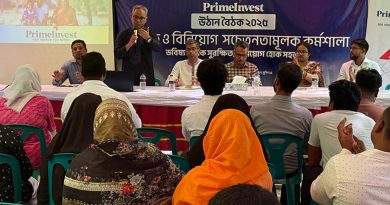Bangladesh has taken a major step toward achieving a fully paperless customs system by 2028, as the National Board of Revenue (NBR) moves to expand its digital platform for import and export clearances.
Following directives from the Chief Adviser’s Office, the NBR is set to integrate 18 additional public and private agencies into the Bangladesh Single Window (BSW) — the country’s key trade digitalisation platform. Currently, 19 agencies, including the Directorate General of Drug Administration and major exporters’ associations, are linked with the system.
According to customs officials, the new agencies — among them the foreign, commerce, and industries ministries, as well as the Federation of Bangladesh Chambers of Commerce and Industry (FBCCI) — will be connected by December 2026.
The BSW has been fully operational across all customs ports since July this year, marking the issuance of half a million customs clearance permits (CLPs) last month.
BSW Project Director Jewel Ahmed said the platform has halved customs processing time and reduced business costs. “Importers no longer need to visit multiple agencies physically, which saves time and supports exporters’ competitiveness ahead of Bangladesh’s LDC graduation in 2026,” he noted.
However, importers say the system’s coverage remains incomplete. They still have to make physical visits for several certificates and licences, a process that can take up to a month. Many argue that without faster integration, the 2028 target may be difficult to meet.
Trade analysts also point out that inefficiencies in customs operations have long hindered foreign investment compared to regional peers such as India, China, and Vietnam.
Sakif Shamim, managing director of Labaid Cancer Hospital, said the lack of coordination among importers, clearing agents, and customs officials often delays the process. He also cited weak real-time value assessments and lingering corruption as key challenges.
Naimul Huda, executive director of finance at Incepta Pharmaceuticals, said the BSW has made importing finished goods easier but urged inclusion of active pharmaceutical ingredients (APIs) to speed up raw material imports. “Otherwise, the industry’s growth could be constrained,” he warned.
The World Bank–funded BSW project, worth Tk 5.85 billion, aims to cut customs clearance time from 11 days to within 24 hours. The digital platform connects 109 trade-related service providers, including the drug administration, the Department of Narcotics Control, and the Plant Quarantine Wing.
World Bank specialist Nusrat Nahid Babi said the platform has already reduced congestion and bureaucratic delays by eliminating in-person certificate collection. But she added that ports handling 99% of international trade are not yet fully digital, leaving room for improvement.
Foreign investors have long cited customs clearance as a major bottleneck. At a recent event, the Japan External Trade Organisation (JETRO) representative noted that slow and cumbersome procedures have discouraged Japanese investment, especially as Bangladesh moves to finalise its Economic Partnership Agreement (EPA) with Japan.
Customs officials said the digital transformation aligns with Bangladesh’s obligations under the World Trade Organisation’s Trade Facilitation Agreement, which calls for paperless trade procedures.
Trade economist Dr M Masrur Reaz welcomed the initiative, calling it “a long-awaited and essential step toward boosting trade facilitation efficiency.” He emphasised that all agencies must build technological and human resource capacity, collect user feedback, and phase out manual processes to ensure the system’s success.
As Bangladesh pushes toward a 2028 deadline, the success of its paperless customs vision will depend on how effectively the government bridges digital gaps, eliminates corruption, and ensures full inter-agency coordination.






